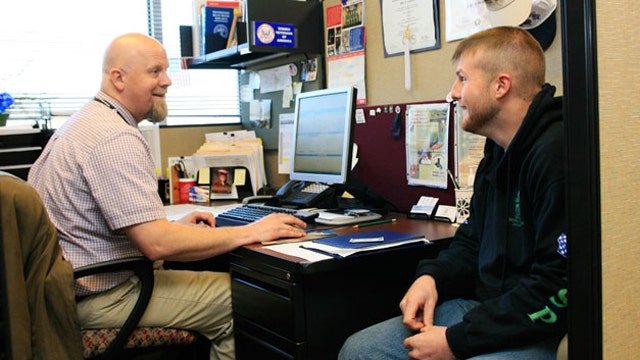Going on a job interview? Say this, not that
3 career experts tell FOX Business what jobseekers should say and do during an interview versus what they shouldn’t
If you’ve snagged a job interview, congratulations.
Now it’s time to prep for the conversation that’ll either improve or dampen your chances with a potential employer.
Here’s a quick list of what you should say and do during an interview versus what you shouldn’t, according to three career experts.
How to answer common interview questions

Job interviews are conducted by hiring managers who are seeking to fill open roles with qualified candidates. (iStock)
If the interview question is: ‘Why are you looking for a new position?’
"Make sure your answers position you as a ‘make it happen’ person, not a ‘let it happen’ person," said Jeff Herzog, president at FPC National, an executive search and recruiting agency.
The "right answer," according to Herzog, would be something along the lines of: "I am not in a rush to leave my current company. I’ve accomplished a lot here, but I am keeping an eye open for roles that will afford me the opportunity to diversify my experience and make a real impact."
Right answer: "I am not in a rush to leave my current company."
The "wrong answer" to this question would be any response that puts blame on others, according to Herzog.
SHOULD YOU WRITE A COVER LETTER? EXPERTS WEIGH IN
For example, "There is no room for growth at my current company and my boss doesn’t allow me to learn new things."
10 SIGNS YOU SHOULD PROBABLY QUIT YOUR JOB
If the interview question is: ‘What are you looking for in a new role?’
"Focus your answers on what you can do for the company instead of what the company can do for you," Herzog told FOX Business.
He said the "right answer" would be, "I am looking for an opportunity that will allow me to leverage my experience, knowledge and contacts and truly help a company to grow and succeed."

Interviews help hiring managers and jobseekers figure out if there's a compatible fit before a formal offer is extended. (iStock)
Meanwhile, the "wrong answer" would be a response that signals you’re mainly interested in having the company grow your career.
For example, Herzog suggests avoiding a response such as, "I am looking for a company that will provide an opportunity to learn and grow and take me to a new level."
If the interview question is: ‘Have you been able to save your company money to impact the bottom line?’
Herzog stressed that questions centered on an interview candidate’s quantifiable achievements should have a "specific" and measurable answer that highlights and supports a person's proclaimed accomplishments.
In this scenario, the "right answer" would provide a confirmation — and an example of the work you did to bring down costs, according to Herzog.
Right answer: "I was instrumental in centralizing all procurement activities for the whole company by bringing in new software …"
For example, "Yes, definitely. Let me give you one example: We were spending way too much sourcing raw materials because each of our five manufacturing facilities were doing it by themselves. I was instrumental in centralizing all procurement activities for the whole company by bringing in new software, which ultimately saved the company $300,000 annually."
HOW TO NEGOTIATE YOUR SALARY, ACCORDING TO AN EXPERT
On the opposite end, the "wrong answer" to this question would be one that’s vague, with no follow-up details.
An example of a not-so-great answer would be, "Yes definitely … I have done that several times," Hezrog said.
If the interview question is: ‘Why did you leave your last job?’ (and you left for ‘personal reasons’)
Whether you temporarily left the workforce to take care of yourself or a family member, it’s important that as a job candidate, you show a potential employer that your life is stable enough to withstand a new job, according to Darcy Eikenberg, leadership coach, speaker and author at Red Cape Revolution, a career coaching resource.

Some job interviews are conducted one-on-one or in groups. (iStock)
The best answer a job candidate could provide, according to Eikenberg, would be something along the lines of: "I needed to take care of some commitments outside of work, but everything's in shape now, and I'm looking forward to being part of a team again."
THESE ARE THE BEST, WORST ENTRY-LEVEL JOBS IN 2022: REPORT
At the same time, Eikenberg said job candidates shouldn’t tell interviewers that they left their "last job for personal reasons," even if it’s true.
"Your job in an interview is to lessen the perceived risk of hiring you, and while your reasons for leaving are your own business, hiring managers need a stronger story to help them eliminate any doubts," she explained to FOX Business.
How to ask interviewers thoughtful questions

Job candidates can get their questions answered by hiring managers during interviews. (iStock)
If you want to know about the company’s culture: Ask this way
When it comes time to ask an interviewer a question, asking behavioral questions with "specific examples" will help jobseekers draw conclusions and determine what’s important to them, according to Eikenberg.
"For example, ask, ‘How does the remote team typically keep in touch with each other?' or ’What happens when a team member needs to be away due to a child's illness or another issue?'" Eikenberg said.
Right question: "How does the remote team typically keep in touch with each other?"
She recommends job candidates avoid asking interviewers to tell them about the company’s culture because it’s "too vague."
BEST CITIES FOR REMOTE WORKERS IN 2022
"People's descriptions of company culture can differ widely from what it's like to work there," Eikenberg said.
If you want to know how a company acknowledges wins: Ask this way
Jobseekers who are most concerned with how potential employers acknowledge achievements should ask how success is measured and by whom, Eikenberg told FOX Business.
"Don't ask, ‘What does success look like here?’" she said. "It's too easy for a hiring manager to adopt a 'we'll know it when we see it' perspective to being successful in a new job; but you want to be clear going in what behaviors are valued most in the role, and whose opinion matters most."
How to communicate and vet jobs like a pro

Job candidates are evaluated by the answers they provide hiring managers during interviews. (iStock)
If you want to be concise: Do this
When speaking to an interviewer, it’s important to relay as much information in your allotted time slot. But this doesn’t necessarily mean you have to rush your answers, said Kim Crowder, workplace diversity expert and founder of Kim Crowder Consulting.
"Use the power of pausing. If you need to think, pause — and say that," Crowder told FOX Business.
4 UNEXPECTED SOURCES OF RETIREMENT INCOME
"I like this question and want to answer it thoughtfully. I am going to think for a minute before sharing my thoughts" is one example that jobseekers can use during an interview, Crowder said.
She continued, "In the right workplace, this will communicate measured thoughtfulness, and you stay in control of your part of the interview by not feeling pressured or rushed."
"Use the power of pausing. If you need to think, pause — and say that."
On the flip side, it’s important that job candidates avoid rambling once they’ve collected their thoughts.
"Don't give unfocused answers to questions," Crowder said. "If you need clarity on what was asked, say so and make sure that the way you answer directly addresses the question."
It's OK for candidates to ask about company specifics: Here's how
Depending on the experiences you’ve had with previous employers, some key points might stand out in your mind.
GET FOX BUSINESS ON THE GO BY CLICKING HERE
For example, a job candidate might be concerned with a potential supervisor’s "management style" during an interview. In a case like this, Crowder said it’d be best for a jobseeker to name a "real-world scenario and ask [the person] what their course of action would be."

Other qualifications are considered before a job offer is extended, which could include work experience and practical skills. (iStock)
"You do not have to reveal that the scenario is yours, so keep it general," she continued. "This will help you understand, at baseline, whether their management style works for you."
Crowder went on to say that she recommends jobseekers not "shy away from asking the hard questions" to which they want answers.
CLICK HERE TO READ MORE ON FOX BUSINESS
"Many times, those who are interviewing do not see interviews as a mutual process," Crowder said.
"Feel free to ask any questions that you have to make you comfortable deciding to take the role. If they do not like that, you know you are not the best fit for the job."




















